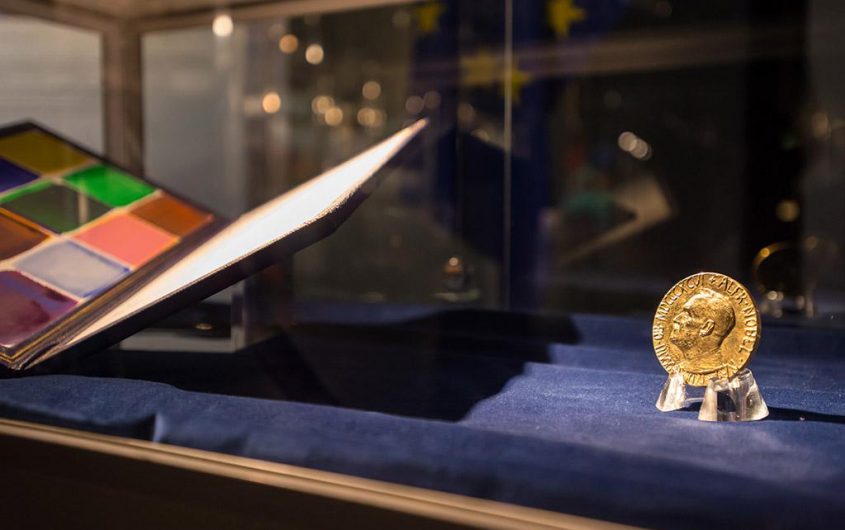
European Parliament via Flickr
The Elusive European Peace

Annika Frieberg
San Diego State University
Originally from Sweden, Annika Frieberg studied Modern and Central European History at the University of North Carolina-Chapel Hill. She teaches courses in 19th and 20th century European and East European history at San Diego State University. Her research and teaching interests center on war and genocide, gender, conflict resolution, media, national, and transnational questions in Central Europe. She has published several articles, including “Reconciliation Remembered. Early Activists and the Polish-German Relations” in Re-Mapping Polish-German Memory, which was published by Indiana University Press in 2011. She is the co-editor of Reconciling with the Past: Resources and Obstacles in a Global Perspective, published by Routledge in 2017. She is the author of Peace at All Costs: Catholic Intellectuals, Journalists, and Media in Postwar Polish-German Reconciliation, published by Berghahn Books in 2019.
She is a 2017-2018 participant in AICGS’ project “A German-American Dialogue of the Next Generation: Global Responsibility, Joint Engagement,” sponsored by the Transatlantik-Programm der Bundesrepublik Deutschland aus Mitteln des European Recovery Program (ERP) des Bundesministeriums für Wirtschaft und Energie (BMWi).
Peace on the European continent is threatened once more. With Russia’s invasion of Ukraine, populism on the rise, and multiple factors undermining the postwar European integration project and challenging the value systems on which the EU was founded, we must now ask ourselves: was the postwar project of peace and stability just a fleeting moment in the continent’s long history of conflicts and aggression? While the invasion of Ukraine does provide motivation for European countries to cooperate and close ranks, the reasons have less to do with policies of peace and more with military security and power. To understand the fluctuations of peace, stability, aggression, and conflict, and their motivations in Europe, it is useful to apply a longer-term perspective rather than keeping our gaze firmly fixed in the postwar era.
What, historically, are the true origins of European conflicts? After the Yugoslav Wars in the 1990s, twentieth century historians and political scientists tended to focus squarely on the evils of ethnic nationalism as the root cause of genocidal warfare. In the recent developments, we have had to reconsider nationalism’s destructive potential as Chad Bryant points out in a recent blog entry for “New Fascism Syllabus.” Meanwhile, Stella Ghervas’ magisterial Conquering Peace, on the long history of peace-motivated diplomacy in Europe, reminds us that drawn out and bitter conflicts are not exclusive properties of twentieth century ethnonational states. She writes, “As the Yugoslav Wars demonstrated, the angry dogma of purity (whether ethnonational, religious or the like)—the Spirit of the Balkans—was a villain in the tragedy, the cause of much bloodshed in modern Europe between and within states.”[1] The primary causes for conflict in Europe, historically, have been territorial conflicts but justified by religion, ethnicity, nationalism, internal colonialism or other sentiments. By expanding our view past the dangers of ethnonationalism we can also reflect more deeply on viable solutions to future conflicts.
Because, despite the bleak current prospect for an end to conflict on the European continent, the consistency of diplomatic initiatives to peacebuilding is cause for a certain optimism. As Ghervas writes; “The Vienna Order of the post-Napoleonic era, the League of Nations that followed World War I, the foundation of the European Communities in the 1950s and the expansion of the European Union after the fall of the Iron Curtain were all attempts to forge greater ‘togetherness.’”[2] While recent scholarship embraces the problematic, power political, and cynical forces, including populism and authoritarianism undermining and challenging European integration, a long-term diplomatic and peacebuilding policy tradition has remained a consistent factor in European diplomacy. Based on historical precedents, there will eventually be a cease-fire and a return to the efforts of creating durable peace in Europe.
The primary causes for conflict in Europe, historically, have been territorial conflicts but justified by religion, ethnicity, nationalism, internal colonialism or other sentiments. By expanding our view past the dangers of ethnonationalism we can also reflect more deeply on viable solutions to future conflicts.
Pointing to the uniqueness of the European project, Ghervas emphasizes two novel strategies in peacebuilding efforts by European founding fathers such as Robert Schuman which, she argues, were more successful than earlier peace treaties and initiatives. First, it was anchored in a “policy of small steps.” In Schuman’s words, “Europe will not be made all at once, or according to a single plan.”[3] The second factor was functionalism, or “advancing toward a large, well-formulated aim without a predefined plan of action, while relentlessly pursuing any opportunities in the desired direction as they presented themselves.”[4] This functional approach prioritized practical goals and common aims, an “organic” merging of interests and economies in incentivizing peacebuilding and was thus more successful than earlier attempts. On the other hand, the economic and practical motives behind European integration also raise the question of to which extent European integration was, in fact, a project motivated by power political rather than idealistic motives. Conquering Peace also points out that “the European construction was a key response to the Soviet presence in Central Europe.”[5] And historian Klaus Kiran Patel notes that, “Many early proponents of European integration also sought to position Western Europe as a ‘third force’ vis-à-vis the United States.”[6] Thus, the premises of twentieth century European integration, beginning with the ECSC may equally have been power politics and security, preserving Europe’s prominence globally—a very different objective from peacebuilding.
It is also necessary to reflect on the role of broader populations and their roles in European integration, particularly in our postwar democracies. Again, functionalism becomes a term crucial to sustainable peace in Europe since these populations at times have practical, material concerns and expectations that take precedence in their political decision-making processes. About the West Europeans, Ghervas writes that they “were not always enthusiastic about the European construction process of the 1990s, perhaps because some of the greatest ills had already been cured: they enjoyed relatively high living conditions and rarely heard about European wide institutions.”[7] From a grassroots perspective, the lack of enthusiasm had two further causes. First, many of them by now envisioned history as linear improvement toward greater stability and prosperity and war on the continent as unthinkable. Exhibiting short-term historical memories, they considered the threat of war between aggressive great powers a thing of the past by the 1990s.
Secondly, they feared the supranational bureaucracies and lack of autonomy that the EU entailed. They felt that global economic interests posed a threat to welfare and their local and internal decision-making processes. After the recession in the 1970s and the weakening of the welfare states in the 1980s, large parts of the populations felt themselves edged out by market-driven political decisions and policies in European states. Unlike the business, cultural, intellectual, and multilingual, highly-educated elites, they saw no particular advantages to open borders and easy flows of resources and skills, and they were all the more unwilling to accept directives and regulations originating far from their own borders. Their position brings us to a larger philosophical question that may however not have a good answer.
In postwar Europe, market economies and greater globalization in combination with European integration seemed to local populations to lessen their autonomy and remove political transparency as well as decision-making away from their immediate vicinity. The political elites’ perspectives and wish for peace, stability, security, economic competitiveness, or a combination of them, caused them to compromise and deprioritize democratic decision-making processes and political transparency for broader populations. The pursuit of policies intended to create peace and stability on the continent has frequently conflicted with the pursuit of fully inclusive democratic procedures. On some level, this tension threatens to undermine peace processes long-term since it means that decisions become insufficiently anchored in European populations. On the other hand, armed conflict poses a more immediate threat to the existence of functioning democracies. In addition, we should not automatically equate popular European interests with national isolation and fragmentation; as stated, the fear of an aggressive neighbor also represents a powerful motivating factor for European integration. At any rate, the balance between long-term decision-making on elite levels, in the interest of anchoring peace processes, whether they consist of memberships in supranational agreements or organizations, such as EU or NATO, diplomatic solutions or treaties, with the interest, involvement, and wishes of broader layers of populations remains a difficult question to solve if we are to exist in democratic systems.
[1] Stella Ghervas, Conquering Peace: From the Enlightenment to the European Union (Cambridge, MA: Harvard University Press, 2021), p. 346.
[2] Ghervas, p. 348.
[3] Ghervas, p. 254.
[4] Ghervas, p. 255.
[5] Ghervas, p. 279.
[6] Kiran Klaus Patel, Project Europe: A History (Cambridge, United Kingdom: Cambridge University Press, 2020), p. 7.
[7] Ghervas, p. 331.








